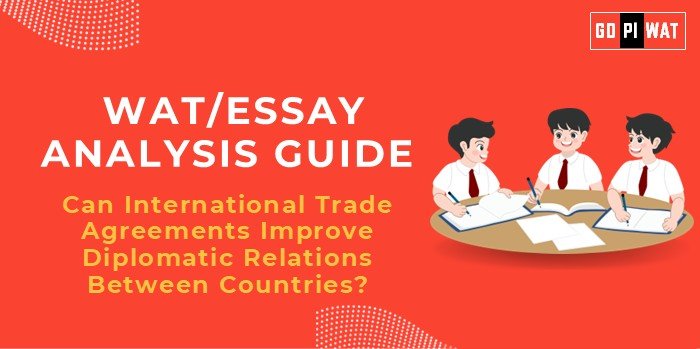📋 Written Ability Test (WAT)/Essay Analysis Guide
🌍 Topic: Can International Trade Agreements Improve Diplomatic Relations Between Countries?
🌐 Understanding the Importance
Trade agreements transcend commerce to become instruments of foreign policy. Writing on this topic helps B-school students connect economic concepts with international relations, essential for leadership in global markets.
📚 Effective Planning and Writing
- Time Allocation:
- ⏱️ Planning: 5 minutes
- ✍️ Writing: 20 minutes
- 🔍 Review: 5 minutes
- Structure: Introduction (60 words), Body (375 words), Conclusion (65 words).
💡 Introduction Techniques
- ⚖️ Contrast Approach: “While trade fosters collaboration, disputes like the US-China tariff war show its fragility.”
- 📅 Timeline Approach: “From GATT in 1947 to WTO reforms in 2024, trade agreements have evolved into diplomatic tools.”
📖 Structuring the Essay Body
- Paragraph 1: Achievements
- 🛠️ Focus on trade agreements as peace-building tools.
- 🌐 Support with examples like the EU or ASEAN.
- Paragraph 2: Challenges
- ⚠️ Highlight trade wars and protectionism, supported by global examples.
- Paragraph 3: Future Outlook
- 🌱 Emphasize sustainable and inclusive trade as the path forward.
🎯 Concluding Effectively
- ⚖️ Balanced: “While trade agreements have improved diplomatic ties, their success requires equitable implementation.”
- 🌍 Global Comparison: “Like the EU, leveraging trade for diplomacy requires robust governance frameworks.”
🔍 Analyzing Successes and Shortcomings
- Key Achievements: Economic integration, dispute resolution.
- Challenges: Power imbalances, geopolitical tensions.
- Global Context: Learning from EU, RCEP, and US-China relations.
🔑 Recommendations for Progress
- 🌐 Enhance transparency and inclusivity in trade deals.
- 🌱 Integrate climate and labor standards.
- ⚙️ Strengthen dispute resolution mechanisms.
📄 Sample Short Essays
- Balanced Perspective:
“Trade agreements enhance diplomacy but must address inequities to sustain peace.”
- Solution-Oriented:
“By integrating labor rights and climate goals, trade agreements can bridge economic and diplomatic divides.”
- Global Comparison:
“The EU proves trade fosters diplomacy; replicating this success requires context-specific adaptations.”


